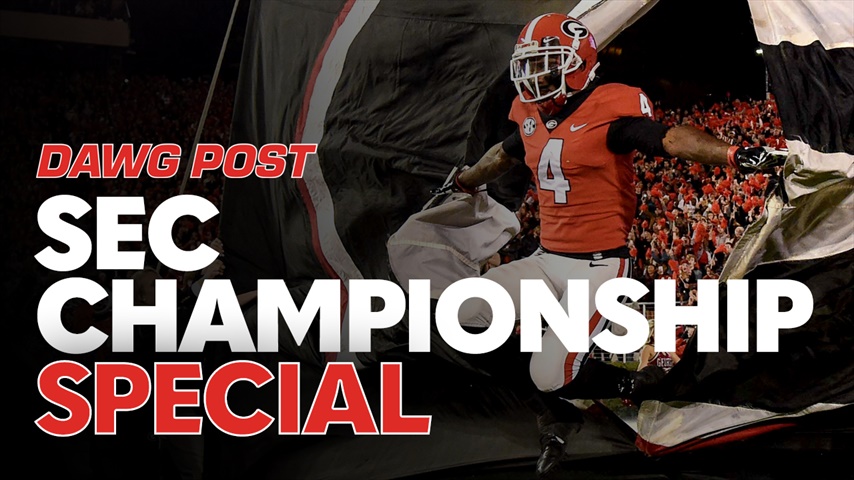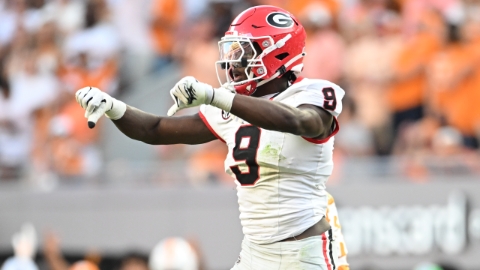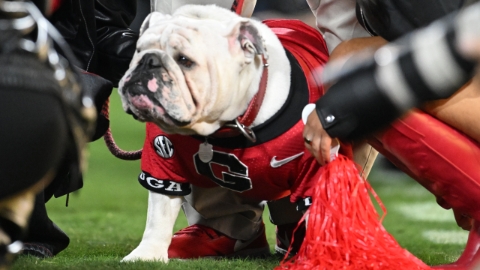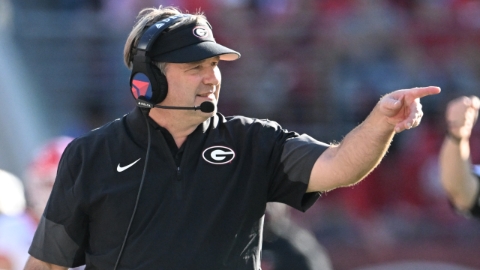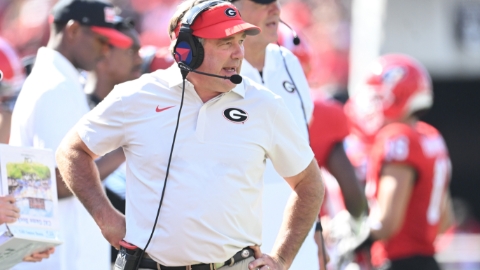The Unsung Hero of Georgia’s Passing Game: Cortez Hankton
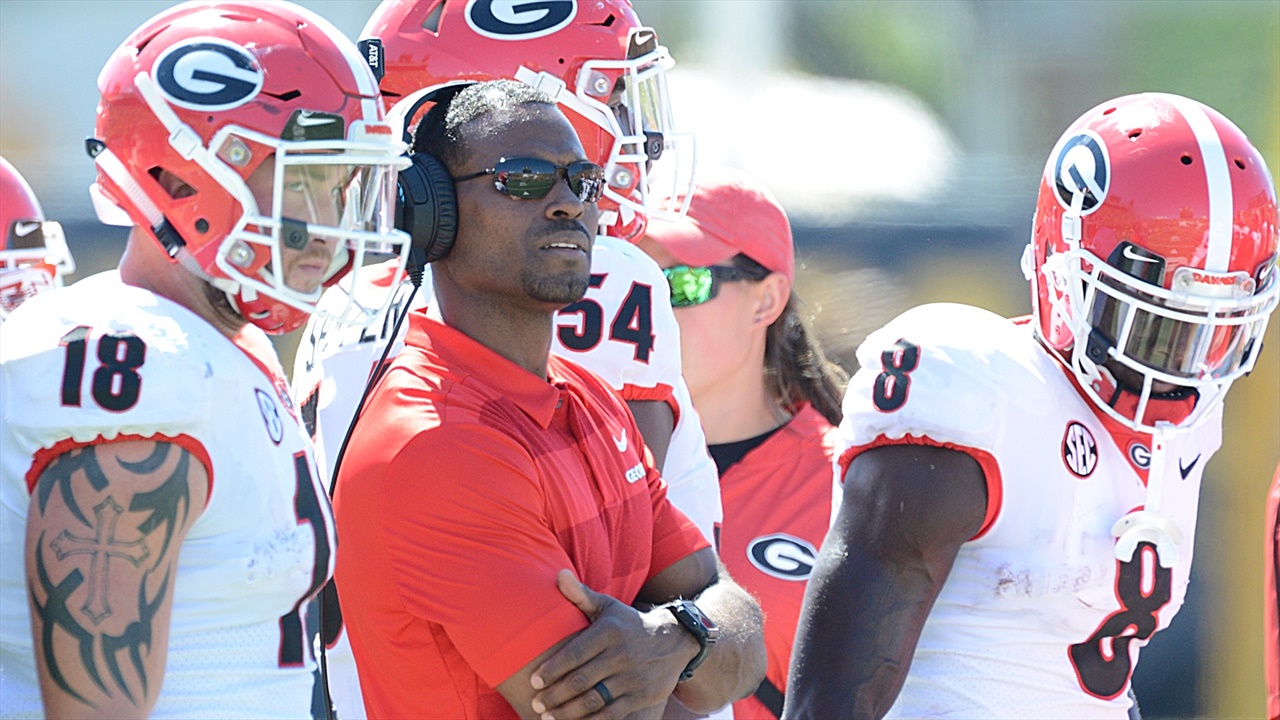
ATHENS - Kirby Smart and first-year wide receiver coach Cortez Hankton Jr. don’t have much in common.
One played big-time college football in the SEC, the other played in the FCS’s Southwestern Athletic Conference. One spent years in the NFL before getting into coaching, the other jumped almost immediately into a graduate assistant role after college. One’s from rural Georgia, the other grew up in metropolitan New Orleans.
There’s one interesting trait that the two do share—an almost crazy level of attention to detail.
Get Dawg Post for two months for $2...
With Smart, you can see the hyper-focus in his game planning. It’s harder to spot with Hankton; almost imperceptible. With a wide receiver room filled with former blue-chip prospects, it looks like they are just making routine catches and plays in games. But when you get an opportunity to see Hankton’s process all the way through, you see it’s effect in almost every one of those catches.
“Guys like [Jim] Chaney and [Sam] Pittman get a lot of credit for their role on offense,” one UGA staffer said. “But people don’t always see what Hank is doing. He puts a lot more effort into the small things. The minute details in route running, the breaks. To fans, it just looks like the receivers making normal plays. For us, we can see the results of the stuff he’s taught them.”
Hankton has developed and refined that meticulous nature at several points throughout his career: in college, the NFL and his early days in coaching. But you can actually trace the roots way back, long before he made a career out of football.
Both of Hankton’s parents were career law enforcement officers, so close attention to detail was crucial to their livelihood. That trait didn’t stick strictly to work, it came home too. His mom and dad “instilled structure” in their kids, according to Hankton’s younger brother Cordae Hankton.
That structure has helped make Hankton become the coach he is today. Though in his playing days, it might have been even more important. When former Texas Southern head coach William “Bill” Thomas recalls his time with Hankton at the turn of the century, he doesn’t cite his elite athleticism. He recalls the calculation in each step Hankton made.
“He was not a speed merchant,” Thomas said. “But he had everything else you needed as a receiver: Nice size, very intelligent, great student. He was very, very detailed when he ran routes.”
Thomas first noticed Hankton’s detail-oriented nature after meetings. As a coach with a defensive background, Thomas didn’t see Hankton much at meetings. But when he would leave defensive film studies, Hankton always seemed to be “standing outside the room questioning the coach about something.” It wasn’t ever to argue with his coaches. It was always for clarity, for organization.
These habits definitely helped him progress as a player. But it wasn’t until Texas Southern brought in Mark Ingram Sr., a nine-year NFL wide receiver, that Hankton’s growth truly exploded. As a player and Super Bowl champion under Bill Parcells, Ingram understood discipline and the importance of the little things. Hankton saw Ingram’s arrival as a huge opportunity and took full advantage. The two would stay late after practice and work one-on-one drills, trying to perfect specific things.
“I thought his development soared under Ingram, I mean really soared,” Thomas said. “We were OK, we were bringing him along, but I thought Ingram was the one to bring him to a point where he was able to play professional football.”
It was around this point where Thomas and his staff realized that, if professional football didn’t work out for Hankton, he would be a good candidate to add to the Texas Southern coaching staff.
But that would have to wait because that professional career did pan out for Hankton. He played six seasons in the NFL with the Jacksonville Jaguars, the Tampa Bay Buccaneers and the Minnesota Vikings, before playing two seasons in the United Football League. Along the way, he was able to learn from great offensive minds like Jay Gruden and Marty Schottenheimer.
When his playing time was up, it was unclear to Hankton what his next step would be. At first, it seemed like he might get out of football and pursue other interests. But he couldn’t; football was too much a part of him.
“I knew that once he retired from the NFL, he would want to get into something else to show people that he wasn’t just a football guy,” Cordae Hankton said. “But like most people, that burning desire for football just never really goes away.”
So there he was, looking to reignite his football career, but in a new role. He started as a volunteer assistant at the University of Central Florida, working mostly on evaluating recruits and organizing travel plans for recruiting trips.
Hankton sent applications to schools around the country, but with no real coaching experience, it was difficult. Not many bit. He was able to pique the interest of only one coach—Buddy Teevens at Dartmouth. Teevens talked to him on the phone and was impressed with what he heard, enough to invite him to Hanover, New Hampshire to talk in person. Teevens asked around with people in New Orleans who knew Hankton and heard only positive things. After being equally impressed with his second conversation with Hankton, Teevens offered him the wide receivers coaching job even with no prior coaching experience.
It was a bit of a gamble for Teevens and one that paid off. He quickly learned that he had hit a home run with his hire.
“He came in and was exceptional,” Teevens said. “He wasn’t just good - he was exceptional.”
In every facet, Hankton blew Teevens away. Even before he got to the coaching part, players took note of his NFL experience.
“His playing experience, it’s street cred right off the bat,” Teevens said. “He was the one-percent—the guy who was undrafted, made it as a free agent and played as long as he did.”
This still holds true today with Hankton. Among the talented pool of Georgia wide receivers, many aspire to play on Sundays in the future in any role they can, just like Hankton did. In that regard, Hankton isn’t a coach as much as he is a role model.
“He was a journeyman NFL player,” Smart said. “He played on special teams, was a third, fourth, fifth wideout for teams… that’s what those guys want to be.”
In recruiting, Teevens was shocked by how quickly Hankton was able to make an impact. He had the knack to deal with anyone: moms, dads, grandparents, recruits themselves, their brothers, sisters, dogs, cats... you name it.
More important to parents, Hankton stayed in touch with them after their sons were enrolled and under his watch. He would keep families in the loop with how things were going with their kids, even if things weren’t going so well.
The parents of current Georgia players are benefitting from that experience now. They can see how much Hankton cares not only about making these kids better football players but better people. Jeremiah Holloman’s mom, Oneida Holloman, was a big fan of James Coley, Georgia’s wide receiver coach in 2016-17 and current quarterbacks coach. With Hankton now in charge, that love has transferred over smoothly.
“I couldn’t have asked for a better replacement for the wide receivers,” Oneida Holloman said. “It was as if God himself was aligning all those he needed just for us.”
Both Hollomans love how available Hankton is to them. They appreciate that “...our concerns are his concerns,” Oneida Holloman said. It’s a family to Hankton. Not just the players, but the players’ families as well.
These qualities have led to a quick ascension in the coaching world. A few years at Dartmouth, where he was looked at as a future head coach. Some time at Vanderbilt, where Derek Mason saw “superstar” potential in his assistant coach.
Now, at his best job yet, none of this praise has gone to Hankton’s head. He still attacks each day with the same curiosity he had standing outside the meeting rooms with his coaches at Texas Southern. This time, it’s with his peers at Georgia, guys like Chaney, Pittman and Smart.
“He’s able to sit there with these guys and pick their brains,” Cordae Hankton said. “If you have guys like that, you’re going to learn ball, and that’s going to keep growing more and more each day.”
Hankton doesn’t learn from only people at Georgia. He seeks all avenues to hear about other positions in football. The easiest one is in his brother, the current defensive coordinator at John Ehret high school in the greater New Orleans area. Two to three times a week, the two talk on the phone and discuss the Xs and Os of football from perspectives of offensive and defensive coaches. The topic can span over a variety of things, yet it always comes down to one main thing—as a coach on the opposite side of the ball, what do you want my players to do, and what do you not want them to do?
The conversations kind of follows the mantra to keep your friends close, but your enemies closer. The Hankton brothers know their sides of the ball well, but if they can think more like their opposition, they can game plan against it better.
The way they talk and analyze each other's coaching, it sounds like the remedy for one of the best, most intense Madden games ever. Surprisingly though for two coaches, it never really happened. Not because of Cordae Hankton’s disinterest, he was a Madden fan. It was because his brother was more into other games, ones you wouldn’t expect from an SEC football coach.
“My brother plays Zelda and Final Fantasy, stuff like that,” Cordae Hankton said. “I call him weird. He likes all kind of games that he can sit there and play by himself for hours.”
While he would play for hours, Cordae Hankton has to sit there and watch waiting for his turn.
“When I was a kid, and he was the big older brother, I had to watch him play Final Fantasy for hours,” Cordae Hankton said with a laugh. “When he was finally tired of playing I could play Madden.”
Those days have since faded for Hankton. Hours spent on video games are now put towards one of the most demanding programs in college football. Two young kids and a wife also aren’t as interested in watching him play video games as his brother was.
It’s probably a little sad to let it go for Hankton, though it’s a small price to pay. He’s on an upward trajectory, not towards defeating Ganondorf in Zelda, but towards bigger positions in the college football world. Georgia is just one of the stops along that path.
